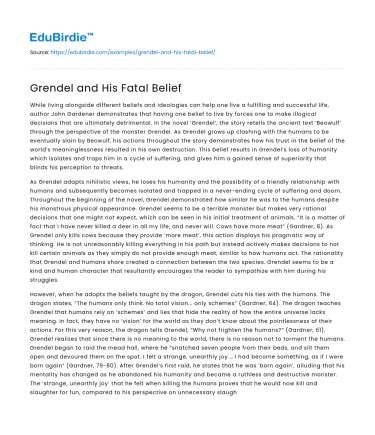While living alongside different beliefs and ideologies can help one live a fulfilling and successful life, author John Gardener demonstrates that having one belief to live by forces one to make illogical decisions that are ultimately detrimental. In the novel ‘Grendel’, the story retells the ancient text ‘Beowulf’ through the perspective of the monster Grendel. As Grendel grows up clashing with the humans to be eventually slain by Beowulf, his actions throughout the story demonstrates how his trust in the belief of the world’s meaninglessness resulted in his own destruction. This belief results in Grendel’s loss of humanity which isolates and traps him in a cycle of suffering, and gives him a gained sense of superiority that blinds his perception to threats.
As Grendel adapts nihilistic views, he loses his humanity and the possibility of a friendly relationship with humans and subsequently becomes isolated and trapped in a never-ending cycle of suffering and doom. Throughout the beginning of the novel, Grendel demonstrated how similar he was to the humans despite his monstrous physical appearance. Grendel seems to be a terrible monster but makes very rational decisions that one might not expect, which can be seen in his initial treatment of animals. “It is a matter of fact that I have never killed a deer in all my life, and never will. Cows have more meat” (Gardner, 8). As Grendel only kills cows because they provide ‘more meat’, this action displays his pragmatic way of thinking. He is not unreasonably killing everything in his path but instead actively makes decisions to not kill certain animals as they simply do not provide enough meat, similar to how humans act. The rationality that Grendel and humans share created a connection between the two species. Grendel seems to be a kind and human character that resultantly encourages the reader to sympathize with him during his struggles.
Save your time!
We can take care of your essay
- Proper editing and formatting
- Free revision, title page, and bibliography
- Flexible prices and money-back guarantee
However, when he adopts the beliefs taught by the dragon, Grendel cuts his ties with the humans. The dragon states, “The humans only think. No total vision... only schemes” (Gardner, 64). The dragon teaches Grendel that humans rely on ‘schemes’ and lies that hide the reality of how the entire universe lacks meaning. In fact, they have no ‘vision’ for the world as they don’t know about the pointlessness of their actions. For this very reason, the dragon tells Grendel, “Why not frighten the humans?” (Gardner, 61). Grendel realizes that since there is no meaning to the world, there is no reason not to torment the humans. Grendel began to raid the mead hall, where he “snatched seven people from their beds, and slit them open and devoured them on the spot. I felt a strange, unearthly joy … I had become something, as if I were born again” (Gardner, 79-80). After Grendel’s first raid, he states that he was ‘born again’, alluding that his mentality has changed as he abandoned his humanity and became a ruthless and destructive monster. The ‘strange, unearthly joy’ that he felt when killing the humans proves that he would now kill and slaughter for fun, compared to his perspective on unnecessary slaughter before. As he had once watched Hrothgar and the other humans massacre each other, Grendel saw their actions as “confusing and frightening, … I was sickened” (Gardner, 36). Grendel was ‘sickened’ by this act of meaningless killing, yet the dragon’s teachings encouraged Grendel to embrace this way of living. As Grendel continued to kill, this action he once despised became normal to him.
As a result of becoming a monster that thrives on killing by discarding his humanity, Grendel subsequently became completely isolated: “I was Grendel, Ruiner of Meadhalls, Wrecker of Kings! But also, as never before, I was alone” (Gardner, 80). Grendel severed any possibility of having a connection with the humans without the use of violence and without being the ‘bad guy’. He once had connections with the humans through their similarities, and could have utilized those to release himself from isolation. However, in his current situation, his only way to connect with the humans and the outside world are through his raids. The dragon’s teachings had, in fact, had trapped Grendel in an endless process of killing the humans. During Grendel’s first raid, he states: “But though I laughed, I felt trapped, as hollow as a rotten tree” (Gardner, 81). As Grendel’s only way to not be completely isolated was through tormenting the humans, he essentially locked himself in an endless cycle of fulfilling his evil role.
Before completely succumbing to the dragon’s beliefs and his monstrous-self, Grendel feels slight regret for killing the innocent humans. Grendel had become stuck in a never-ending cycle of killing humans for the sake of escaping isolation. Therefore, “Futility, doom, became a smell in the air, pervasive and acrid as the dead smell after a forest fire - Grendel’s scent and the world’s, the scent of trees, rocks, waterways wherever Grendel went” (Gardner, 75). He was persuaded by the dragon’s words to follow the role of a monster by abandoning his humanity. The crude adjectives such as ‘acrid’ and ‘dead’ that describe the smell he emits also demonstrates Grendel’s opinion on his rebirth. He was happier before with his humanity as there was hope for a good relationship with the humans. But now, Grendel continues to suffer and is destined to do so until he is destroyed — by Beowulf.






 Stuck on your essay?
Stuck on your essay?

